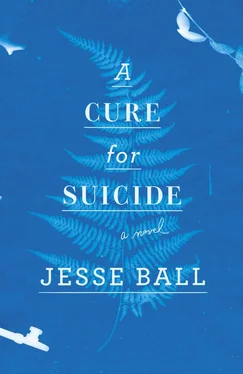Could I have a glass of water again, I asked. He nodded, and went out into the hall to fetch it. When he had given me water before, I hadn’t noticed him leave, but perhaps he had. He returned and stood there, handing me the glass. I took it and drank. He sat. I was embarrassed, I said. She had never disclosed any of this before, and now, there in the mountains, I felt we were coming to the heart of my unsuitability. So, I told the interlocutor, there in the daybed, she said to me, in complete seriousness, she said, about my father, in that conversation in our house, three weeks ago, in which he mentioned out loud that darling of his mind, the Hruezfeldt dam, a thing which, to my knowledge he had never done — always before he had called it the dam or the backbone, already he had been so kind and solicitous in this conversation as to mention the dam by name — and you told him, fiercely, that perhaps a different source of power could be used to replace the dam, you said it loosely, easily, a different source of power, and then the province wouldn’t need to rely on water, on that form of power, which after all was only one of many ways. After all, during your time in the civil corps, you had worked on other forms of energy, so you said. Water was not the final ends and means. You said it matter-of-factly and without rancor, but the offense you gave was enormous and sudden. I remember in particular the callous way you threw in this colloquialism, ends and means. The whole table was horrified. My father reeled back in his chair. Make the Hruezfeldt dam, the enormous Hruezfeldt dam, into a sort of architectural folly? Declare the work of our hands, of our fathers’ hands, and of their fathers’ hands, all some sort of mistake? The Hruezfeldt dam? Was I speaking about that dam or about some other? It had been frightening, said Rana, to hear my father spoken to in this way, and indeed, she had never seen him respond in that manner to anyone, never having needed to. You recall that I spoke for you, saying that, of course, we were speaking extremely theoretically about it. We, in the dining room of a house nowhere near Hruezfeldt, some of us never having even been there, never having even seen the dam itself, were extremely theoretically discussing it. I told him, she said, that this young man, you, understood the matter was not the Hruezfeldt dam, but the province itself and the political map. Perhaps, I suggested, she told me, perhaps, I said to my father, that an alternate suggestion was to redraw the political map of the province. So she said to me, remembering her interaction with her father, and so I told the interlocutor. Do you recall, she said, how, as soon as my voice, with its known cadence, rose in the family dining room, my father appeared assuaged? Do you recall how as the gentle good sense of my measure, so quickly suggested, washed over him, he fell at peace at once. He merely nodded, and took another bite of his food, the matter forgotten. The only glimmer of it was when we rose from the table and he dismissed himself, he went to bed early. Do you remember it? She pressed my hand, there on the daybed. It wasn’t your fault, she said, but you simply can’t understand him, or any of them. It would be like trying to run a race beneath a road while the rest of them were running upon it. You would always finish last. There we were, sitting in the lodge that her father had bought as a child, and I had learned this truly momentous thing: I would never become a part of her family. Also, I learned a corollary and equally momentous thing: she did not care. We would go away together and never see any of them again. She would make occasional trips back to see them, but I would not be in attendance. There would be no reason for it, she said. She delighted in planning these details of our life. For her, my absolute rootlessness, the fact that I had no family, had little connection to anyone, lived in a boardinghouse, wrote inconsequential ideas in little notebooks, and generally was beneath all notice — for her, that was wondrous. My very nonentity made it easy for me to be assimilated instantly and totally into her plans. She was one, I confided in the interlocutor, who could not speak of something if there was the least chance it was not realistic. She did not want to waste her time in unrealizable projects. For her, she could take no joy in them. All the same, with her family’s vast wealth, many projects that seemed to me from the get-go foolish or impossible, were to her completely sensible, inevitable even. That I could be without a doubt incorporated into her plans made it easy for her to chart with pleasure the things that she would want to do, and made it conceivable that these plans, fleshed out in her mind, could be said out loud to me, and related. I have never before, she told me, planned with anyone. Even my brother, whom I loved dearly, and even all my other brothers and sisters, who were already grown when I was a child, even they have never heard me plan. They believe that I have no plans, that I go from day to day planless. Of course, to them, this is sensible. They live extremely coherently within the traditions of our family. You will, I’m sure, meet them all briefly, at one or another family event where you are absolutely required. You will see that they are of a piece. I am to some degree viewed as a wild person. I have had friends, for instance, who are not in the family. This is a liberty my mother never had. Indeed, I went to school outside of the home, another strangeness. You could say that I was a sort of experiment that my father made. It has turned out well, I told her. Yes, very well, she agreed. Shall we go outside, I asked her, for it had begun to rain, and the raindrops were sounding on the porch roof. I helped her to a chair on the porch and we sat there, staring out into the rain. Sometimes, she told me, I feel that we are in the clouds here. Of course, it’s nonsense. We are not that high up, but I sometimes enjoy thinking that we are. I looked out at the clouds, and I felt that she was right. She was right that we were in the clouds, and that we were not in the clouds. This occasioned a small happiness that ran along my spine and out to the cuffs of my shirt. Rana looked at me very seriously, then. That chair was the chair that Seamus Mendols always sat in. He was my father’s rival. He would visit and they would argue, angrily, for hours. Nothing was good enough for him. He was angry at my father for not living up to what Seamus Mendols had expected for him. He was angry at my father for having children who had failed to do things as great as the things that my father ought to have done, the things my father had not done, but that Seamus Mendols had expected of him. Seamus Mendols could drink any amount of liquor and get nowhere near drunk. He could reason like a logician, and he picked apart everything that anyone said, as if it were a necessary function of the conversation, that it be reduced to its barest, most functional essentials. The lessons in logic that we all received, even my father, a so-called finished person, a true gentleman, the lessons we received from Seamus Mendols during the summer months of my childhood, were truly something. Seamus Mendols hated the days of the week. He disliked the base-ten numbering system. He argued against clothing that required zippers or snaps. He was writing a book, had been writing a book forever, the publishing of which, at some point in the future, would be a great corrective. No one but my father had seen this book. He would not speak of it, but sometimes Seamus would say to my father, in passing, as they spoke of something else, as in 3:12:92, referring to a passage. Then, my father would nod, and understand, so thoroughly had he read this work of Seamus Mendols. My brother was inadequate. To Seamus Mendols, my brother was a sort of joke. My sisters and brothers who were long grown, but whom Seamus Mendols had watched grow, sitting on that same porch, long before my birth, they were, if anything, richer jokes than my brother was. However rich the joke of my brother was to Seamus Mendols, the sisters and brothers who had preceded him were richer. That so many little beings could issue forth from my father, and none of them, not a one could make any motion to complete the work that was my father’s to do was to Seamus Mendols a frightening, sad, and inevitable confirmation of the world’s slothful indifference. Of the world’s impassive, perfect indifference. Its slothful indifference. He could not decide. He would sit in the chair repeating first the one and then the other back and forth. My own arrival, Seamus Mendols greeted with animation. He thought of me as a sort of antidote to the general horror of my family. She is your better, he would tell my father again and again. Of course, it was not true. My father knows everything I know, and then beyond that, he knows other things the existence of which I have not guessed at, and he moves through all of it with ease. I, meanwhile, make my small attempts. Seamus Mendols saw these attempts and rewarded me for them, for each one, with a cheerfulness that was quite rousing. It was his idea that I go to a college, that I be educated in public school. He spoke to my father, and I was their little experiment. When Seamus Mendols died, at the house he kept just up that road over there, my father said, I will never come back. He has not returned to this town since that day. That is how dear Seamus Mendols was to him. My mother, my father could bear. He can speak to her and live with her day in day out. But, I believe the person whose company he most enjoyed was Seamus Mendols. The chair you are sitting in right now is the chair he spent years of his life in. There is no such thing as feeling the effects of that. Seamus Mendols does not linger in that chair. But perhaps you can enjoy the view, and feel the import of it. When I was here as a child, no one but Seamus could ever sit in that chair. My father did not make a rule of this, nor did he enforce it. It was unspoken.
Читать дальше












